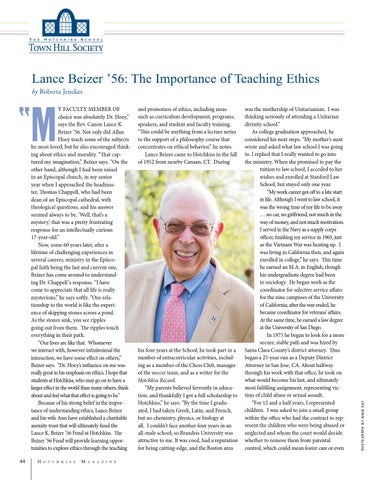Lance Beizer ’56: The Importance of Teaching Ethics
M
Y FACULTY MEMBER OF choice was absolutely Dr. Hoey,” says the Rev. Canon Lance K. Beizer ’56. Not only did Allan Hoey teach some of the subjects he most loved, but he also encouraged thinking about ethics and morality. “That captured my imagination,” Beizer says. “On the other hand, although I had been raised in an Episcopal church, in my senior year when I approached the headmaster, Thomas Chappell, who had been dean of an Episcopal cathedral, with theological questions, and his answer seemed always to be, ‘Well, that’s a mystery,’ that was a pretty frustrating response for an intellectually curious 17-year-old.” Now, some 60 years later, after a lifetime of challenging experiences in several careers, ministry in the Episcopal faith being the last and current one, Beizer has come around to understanding Dr. Chappell’s response. “I have come to appreciate that all life is really mysterious,” he says softly. “Our relationship to the world is like the experience of skipping stones across a pond. As the stones sink, you see ripples going out from them. The ripples touch everything in their path. “Our lives are like that. Whomever we interact with, however infinitesimal the interaction, we have some effect on others,” Beizer says. “Dr. Hoey’s influence on me was really great in his emphasis on ethics. I hope that students at Hotchkiss, who may go on to have a larger effect in the world than many others, think about and feel what that effect is going to be.” Because of his strong belief in the importance of understanding ethics, Lance Beizer and his wife Ann have established a charitable annuity trust that will ultimately fund the Lance K. Beizer ’56 Fund at Hotchkiss. The Beizer ’56 Fund will provide learning opportunities to explore ethics through the teaching
44
H
o t c h k i s s
M
a g a z i n e
and promotion of ethics, including areas such as curriculum development, programs, speakers, and student and faculty training. “This could be anything from a lecture series to the support of a philosophy course that concentrates on ethical behavior,” he notes. Lance Beizer came to Hotchkiss in the fall of 1952 from nearby Canaan, CT. During
his four years at the School, he took part in a number of extracurricular activities, including as a member of the Chess Club, manager of the soccer team, and as a writer for the Hotchkiss Record. “My parents believed fervently in education, and thankfully I got a full scholarship to Hotchkiss,” he says. “By the time I graduated, I had taken Greek, Latin, and French, but no chemistry, physics, or biology at all. I couldn’t face another four years in an all-male school; so Brandeis University was attractive to me. It was coed, had a reputation for being cutting-edge, and the Boston area
was the mothership of Unitarianism. I was thinking seriously of attending a Unitarian divinity school.” As college graduation approached, he considered his next steps. “My mother’s aunt wrote and asked what law school I was going to. I replied that I really wanted to go into the ministry. When she promised to pay the tuition to law school, I acceded to her wishes and enrolled at Stanford Law School, but stayed only one year. “My work career got off to a late start in life. Although I went to law school, it was the wrong time of my life to be away … no car, no girlfriend, not much in the way of money, and not much motivation. I served in the Navy as a supply corps officer, finishing my service in 1965, just as the Vietnam War was heating up. I was living in California then, and again enrolled in college,” he says. This time he earned an M.A. in English, though his undergraduate degree had been in sociology. He began work as the coordinator for selective service affairs for the nine campuses of the University of California; after the war ended, he became coordinator for veterans’ affairs. At the same time, he earned a law degree at the University of San Diego. In 1975 he began to look for a more secure, stable path and was hired by Santa Clara County’s district attorney. Thus began a 25-year run as a Deputy District Attorney in San Jose, CA. About halfway through his work with that office, he took on what would become his last, and ultimately most fulfilling assignment, representing victims of child abuse or sexual assault. “For 12 and a half years, I represented children. I was asked to join a small group within the office who had the contract to represent the children who were being abused or neglected and whom the court would decide whether to remove them from parental control, which could mean foster care or even
P H O T O G R A P H B Y A N N E D AY
by Roberta Jenckes
